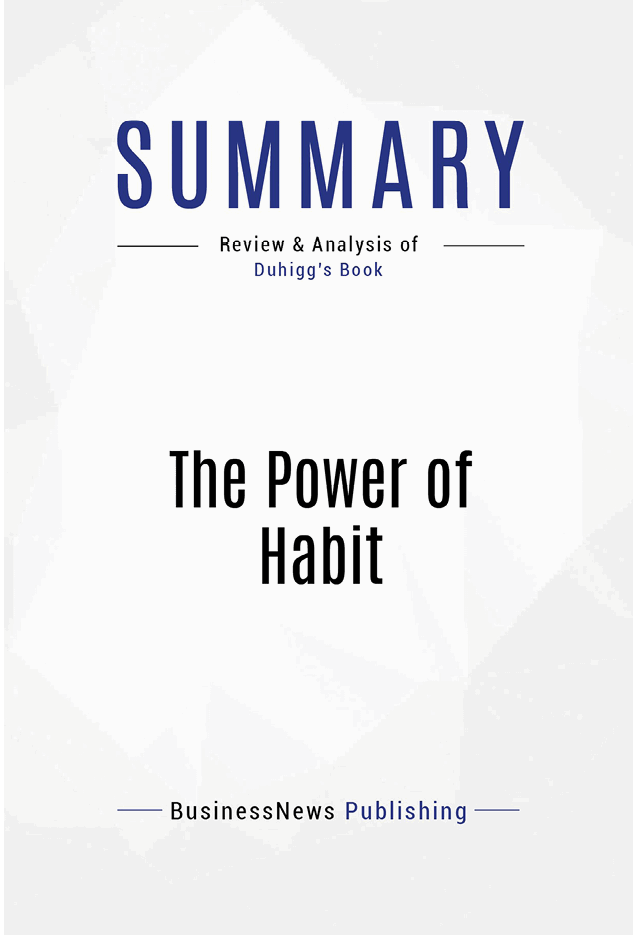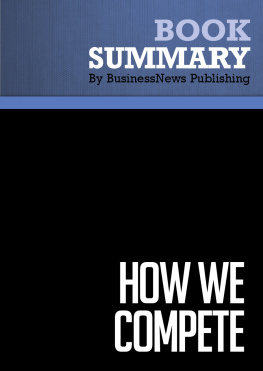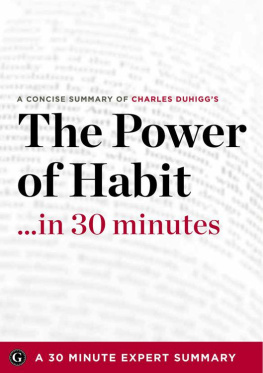BusinessNews Publishing - Summary: The Power of Habit: Review and Analysis of Duhiggs Book
Here you can read online BusinessNews Publishing - Summary: The Power of Habit: Review and Analysis of Duhiggs Book full text of the book (entire story) in english for free. Download pdf and epub, get meaning, cover and reviews about this ebook. year: 2015, publisher: Business Book Summaries, genre: Romance novel. Description of the work, (preface) as well as reviews are available. Best literature library LitArk.com created for fans of good reading and offers a wide selection of genres:
Romance novel
Science fiction
Adventure
Detective
Science
History
Home and family
Prose
Art
Politics
Computer
Non-fiction
Religion
Business
Children
Humor
Choose a favorite category and find really read worthwhile books. Enjoy immersion in the world of imagination, feel the emotions of the characters or learn something new for yourself, make an fascinating discovery.

- Book:Summary: The Power of Habit: Review and Analysis of Duhiggs Book
- Author:
- Publisher:Business Book Summaries
- Genre:
- Year:2015
- Rating:5 / 5
- Favourites:Add to favourites
- Your mark:
- 100
- 1
- 2
- 3
- 4
- 5
Summary: The Power of Habit: Review and Analysis of Duhiggs Book: summary, description and annotation
We offer to read an annotation, description, summary or preface (depends on what the author of the book "Summary: The Power of Habit: Review and Analysis of Duhiggs Book" wrote himself). If you haven't found the necessary information about the book — write in the comments, we will try to find it.
BusinessNews Publishing: author's other books
Who wrote Summary: The Power of Habit: Review and Analysis of Duhiggs Book? Find out the surname, the name of the author of the book and a list of all author's works by series.
Summary: The Power of Habit: Review and Analysis of Duhiggs Book — read online for free the complete book (whole text) full work
Below is the text of the book, divided by pages. System saving the place of the last page read, allows you to conveniently read the book "Summary: The Power of Habit: Review and Analysis of Duhiggs Book" online for free, without having to search again every time where you left off. Put a bookmark, and you can go to the page where you finished reading at any time.
Font size:
Interval:
Bookmark:



Book Abstract
Habits can be changed if you understand how they work. At the core of every habit you have lies a reasonably simple neurological loop:
Cue Routine Reward
If you want to change and reshape your habits for the better:
- Identify the routines you currently follow and figure out how you can change your routines so you swap vices for virtues.
- Experiment with different rewards until you can isolate what you're actually craving when you do something habitually. If you can figure out what you're genuinely craving, then you understand how to make a desired behavior automatic.
- Isolate the cue that triggers your habit what it is that signals it's time to do something. There are in practice only five types of cues: location, time, your emotional state, other people or an immediately preceding action. Figure out what sparks your habit to occur.
- Then develop a new plan for what you'll do differently the next time that cue arises. When you get right down to basics, habits are formulas your brain automatically follows: When you see a CUE, you do a ROUTINE in order to get the REWARD. To change your habit, keep the cue and the reward the same and insert a new routine.
Obviously, changing some habits can be more difficult. But this framework is the place to start. Sometimes change takes a long time. Sometimes it requires repeated experiments and failure. But once you understand how a habit operates once you diagnose the cue, the routine and the reward you gain power over it. Transforming a habit isn't necessarily easy or quick. It isn't always simple. But it is possible. And now we understand how.
- Charles Duhigg
About the Author
CHARLES DUHIGG is a reporter for the New York Times where he has been a contributor to a Pulitzer Prize winning series titled "The iEconomy." He is a graduate of Yale University and Harvard Business School. In addition to having his articles published, he has also appeared on several TV shows including This American Life , The Newshour with Jim Lehr and Frontline. Before becoming a journalist, he worked in a private equity firm and founded an education management business.
Important Note About This Ebook
This is a summary and not a critique or a review of the book. It does not offer judgment or opinion on the content of the book. This summary may not be organized chapter-wise but is an overview of the main ideas, viewpoints and arguments from the book as a whole. This means that the organization of this summary is not a representation of the book.
1. How habits form in the lives of individuals
It has been estimated that more than 40 percent of the actions you perform every day are the result of your habits rather than deliberate decisions you're making. With that in mind, it makes sense to get to understand how habits form and work. It's all due to the operation of the "Habit Loop" you see a cue and you therefore follow a routine to get the reward you crave. To build new habits or change old ones, keep the cue and the reward the same and look for ways to swap out old routines for new and improved routines.
What is a habit? Technically, it can be defined as the situation where you make a deliberate decision at some point to do something and then stop thinking about your choice as you continue to follow the same routine over and over. With habits, what you do becomes automatic rather than requiring you to decide what to do each time.
Researchers at MIT started studying habits in earnest in the 1990s and since that time have been able to show the section of the brain which is involved in habit formation is known as the basal ganglia. If you visualize the brain as an onion, the outer layers (near the scalp) are the most recent additions from an evolutionary perspective. These outer layers handle creative thinking and social interactions. The basal ganglia is one of the innermost layers and is roughly the size of a golf ball in the center of the skull.
Habits, scientists say, emerge because the brain is constantly looking for ways to save effort. Left to its own devices, the brain will try to make almost any routine into a habit, because habits allow our minds to ramp down more often. This effort-saving instinct is a huge advantage. An efficient brain requires less room, which makes for a smaller head, which makes childbirth easier and therefore causes fewer infant and mother deaths. An efficient brain also allows us to stop thinking constantly about basic behaviors, such as walking and choosing what to eat, so we can devote mental energy to inventing spears, irrigation systems, and, eventually, airplanes and video games. But conserving mental effort is tricky, because if our brains power down at the wrong moment, we might fail to notice something important, such as a predator hiding in the bushes or a speeding car as we pull onto the street. So our basal ganglia have devised a clever system to determine when to let habits take over. Its something that happens whenever a chunk of behavior starts or ends.
- Charles Duhigg

The Habit Loop lies at the heart of every habit which you will ever form. It can be broken down into three basic and essential components:
- Cue there is something which tells your brain it's safe to go into automatic mode rather than having to think intensively about every choice you face. Cues can be external or internal:
- The time of day.
- The company of certain other people.
- Your location.
- Your current emotional state.
- A trigger action which happens externally.
- Routine what you do automatically whenever the habit is triggered. Routines are patterns of behavior and can be physical, mental or emotional. The brain expends a lot of energy at the beginning of a habit loop looking for a cue which signals which routine to use but then once you start on a routine, the brain shuts down and rests because your actions are predetermined and automatic.
- Reward what you get out of performing your habit. The reward helps your brain figure out whether what you did in this habit loop is worth remembering for the future or not. At the end of each habit loop, the brain always gets into action deciding whether that specific loop is worth remembering or not based on the reward derived.
Admittedly, habits aren't destiny. You can choose whether or not to ignore a habit at any time. The brain does, however, prefer to form habits because they are so much more efficient. Once a habit is in place, the brain can stop working so hard and instead focus on something else.
The great thing about understanding the Habit Loop is once you do know the basic components, you can start fiddling with them and optimizing them. By varying the cues, your routines and your rewards, you can change your habits.
Without habit loops, our brains would shut down, overwhelmed by the minutiae of daily life. People whose basal ganglia are damaged by injury or disease often become mentally paralyzed. They have trouble performing basic activities, such as opening a door or deciding what to eat. They lose the ability to ignore insignificant detailsone study, for example, found that patients with basal ganglia injuries couldnt recognize facial expressions, including fear and disgust, because they were perpetually uncertain about which part of the face to focus on. Without our basal ganglia, we lose access to the hundreds of habits we rely on every day.
Font size:
Interval:
Bookmark:
Similar books «Summary: The Power of Habit: Review and Analysis of Duhiggs Book»
Look at similar books to Summary: The Power of Habit: Review and Analysis of Duhiggs Book. We have selected literature similar in name and meaning in the hope of providing readers with more options to find new, interesting, not yet read works.
Discussion, reviews of the book Summary: The Power of Habit: Review and Analysis of Duhiggs Book and just readers' own opinions. Leave your comments, write what you think about the work, its meaning or the main characters. Specify what exactly you liked and what you didn't like, and why you think so.


